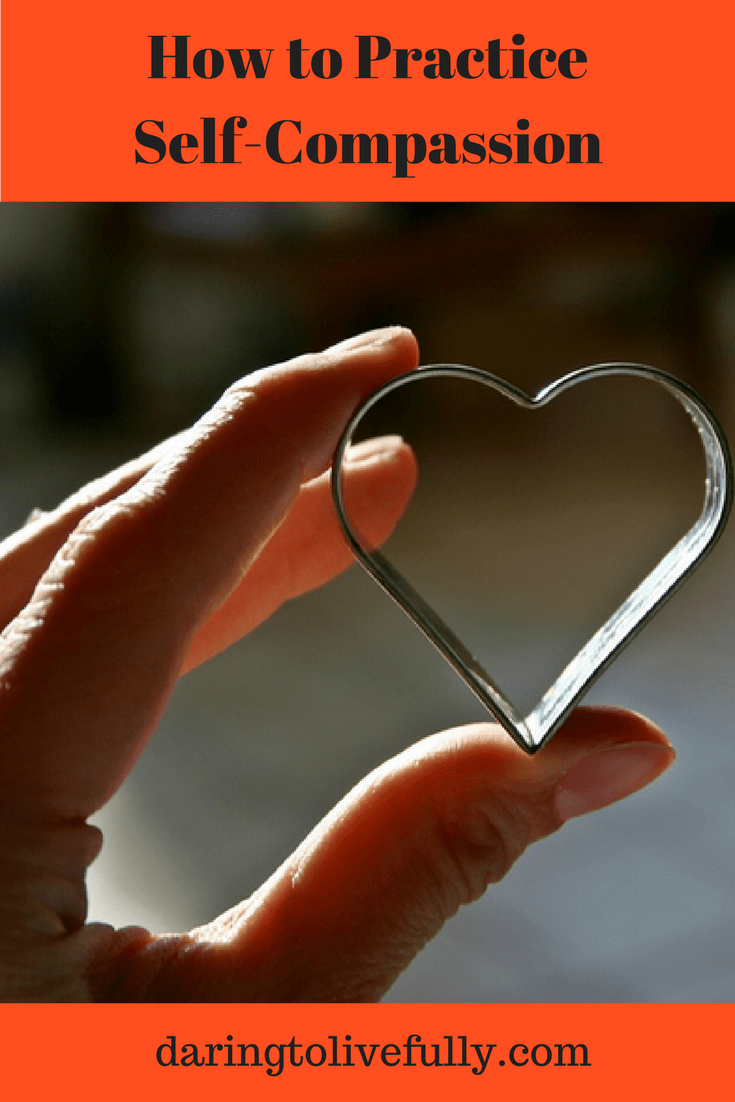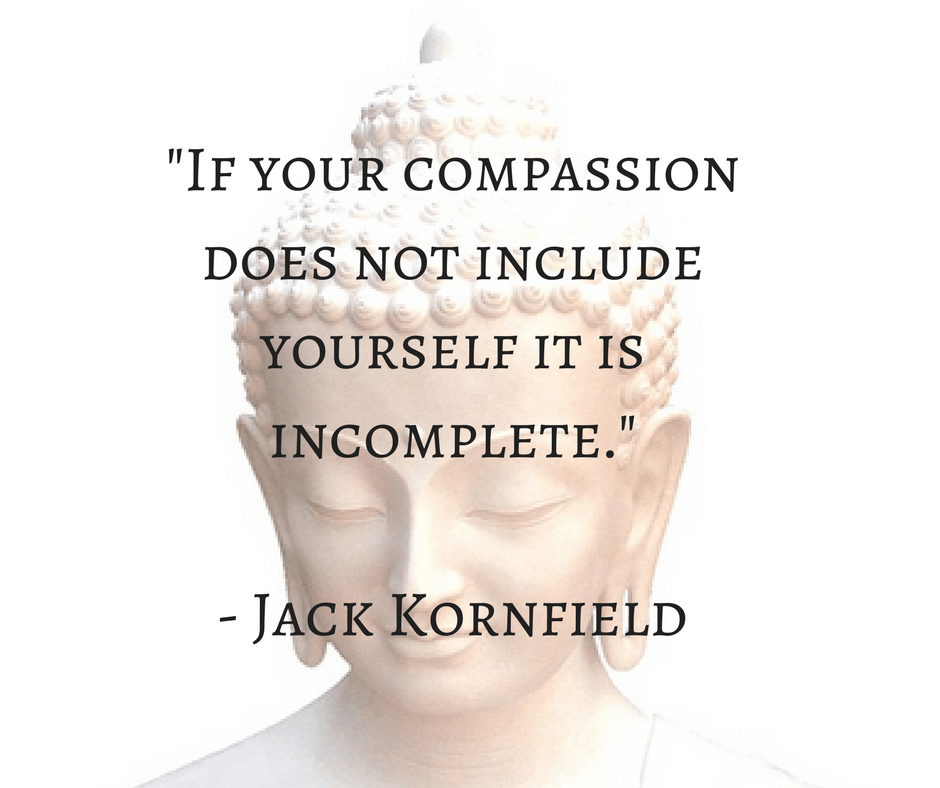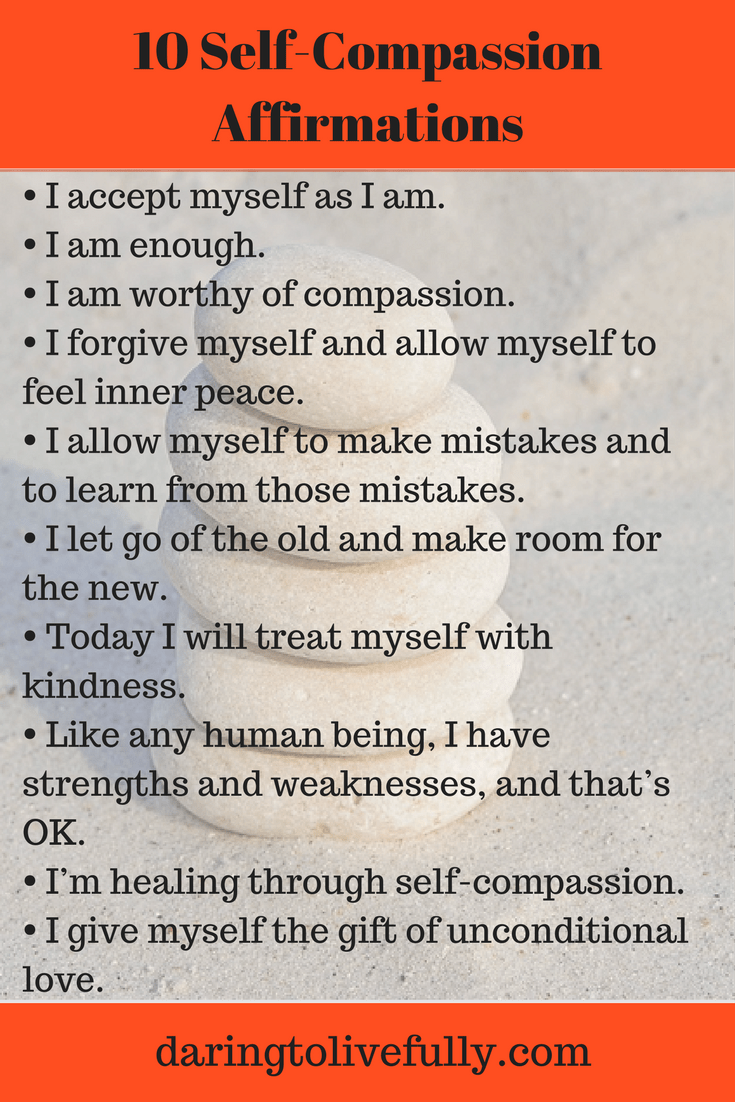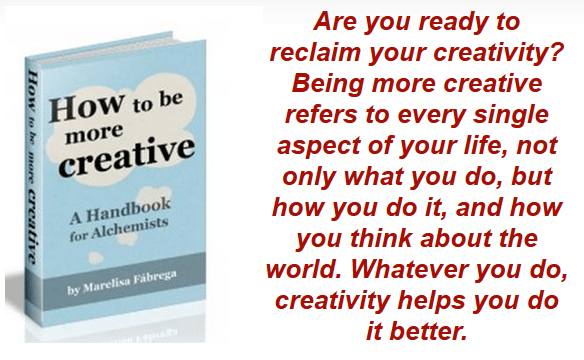
Self-compassion is extending kindness, love, and understanding toward ourselves.
Having self-compassion means the following:
- We love and accept ourselves;
- We understand that failing and making mistakes is a normal part of the human experience;
- We’re capable of forgiving ourselves;
- We treat ourselves with kindness and respect;
- We give ourselves the self-care that we need; and
- We’re a good friend to ourselves when things go wrong.
Self-compassion has been found to have a significant positive correlation with lower levels of anxiety and depression, as well as higher levels of happiness, optimism, personal initiative and agreeableness. Fortunately, self-compassion can be developed. Below you’ll find five ways to practice self-compassion.
1. Be Kind to Yourself.
 The other day I was over at my sister’s house and my 9-year-old nephew was showing me some card tricks his dad had taught him. Although he pulled off one of the tricks to perfection, the other tricks he showed me didn’t go so well. (At one point, most of the cards ended up on the floor.) Nonetheless, he’s a kid and I love him, so I was very kind. Since I don’t just want him to feel good about himself, but I also want him to improve, I told him things like the following:
The other day I was over at my sister’s house and my 9-year-old nephew was showing me some card tricks his dad had taught him. Although he pulled off one of the tricks to perfection, the other tricks he showed me didn’t go so well. (At one point, most of the cards ended up on the floor.) Nonetheless, he’s a kid and I love him, so I was very kind. Since I don’t just want him to feel good about himself, but I also want him to improve, I told him things like the following:
- “It’s great how much you love card tricks, and I see that you have a lot of potential.”
- “You almost got that one! If you practice that trick a few more times, I’m sure you’ll get better and better at it.”
- “That’s a tough trick. I know your dad had to practice it a lot before he got it right.”
- “I want you to go through those tricks a few more times, and then call me and I’ll come over to watch you again.”
When I left, he was feeling very good about himself and was hard at work perfecting his card tricks.
As my readers know, I love learning new things and am constantly improving my skills and adding to my knowledge repertoire. However, learning something new can be incredibly frustrating. A lot of the time—when I mess up or make a mistake when I’m starting out with a new skill– my inner critic starts going ballistic:
- “You suck at this!”
- “Just give up already.”
- “This is pathetic. Just pathetic.” (My inner critic loves the word “pathetic”.)
But then I remember to show myself some self-compassion and to be kind to myself. This leads me to change my inner dialogue to something along the following lines:
- “Everyone is bad at the beginning.”
- “Making mistakes is how you learn.”
- “I just need to practice. Then I’ll be good at this.”
After showing myself some kindness and self-compassion, I always feel better about myself and about my ability to learn new things. If you want to start feeling more self-compassion, whenever you mess up, be as kind to yourself as you would be to a 9-year-old you really care for.

2. Use Self-Compassion As a Motivation Technique.
Think of the following two characters:
- A gruff army drill sergeant yelling at you to push through the pain and do one more sit-up, or else.
- An optimistic mentor who cheers you on to do your best and encourages you when you feel discouraged.
Which of these two characters do you think would be most likely to help you to achieve your goals? Most people would pick the mean, yells in-your-face drill sergeant. After all, we’re conditioned to think that this abusive-type of behavior is what gets results. Therefore, that’s how we tend to talk to ourselves when we’re pursuing a goal.
However, studies show that, in fact, the second character is more effective. Kelly McGonigal is a psychologist at Stanford University and the author of The Neuroscience of Change: A Compassion-Based Program for Personal Transformation. She refers to a study in which participants took a very difficult test which was chosen to induce a sense of struggle and frustration.
Some of the participants were given a self-compassion induction after the test, while other participants were not. Specifically, this is the self-compassion message that some of the participants heard:
“If you had difficulty with the test you just took, you’re not alone. It’s common for students to have difficulty with tests like this. If you feel bad about how you did, try not to be too hard on yourself.”
Researchers found that the participants who received the self-compassion message showed greater willingness to study in order to improve their performance on the difficult test. McGonigal adds that a self-compassionate point of view will help you recover from setbacks and motivate you to pursue positive change.
In addition, Kristin Neff, Ph.D., author of Self-Compassion: The Proven Power of Being Kind to Yourself explains that people who are self-compassionate are less afraid of failing. After all, if you lack self-compassion you know that the voice in your heard is going to insult and berate you each time you fail. Therefore, you’ll be terrified of failing.
People who are self-compassionate, on the other hand, know that if they fail the voice in their head will encourage them to learn from their mistake, shake it off, and then try again. This makes them more willing to get out there and try new things.
3. Stop Thinking of Self-Compassion as Self-Indulgence.
Some people don’t allow themselves to feel self-compassion because they feel it’s self-indulgent. Here’s what some people think self-compassion looks like:
- Allowing yourself to zone out in front of the TV for three or four hours because you had a tough day at work.
- Eating that second brownie covered in vanilla ice cream because you deserve it.
- Buying things you can’t afford because you want them.
- Constantly letting yourself off the hook.
But that’s not what self-compassion means at all. Lea Seigen Shinraku, MFT, a therapist in private practice in San Francisco, explains that self-indulgence is short-sighted. It feels good in the short-term, but has negative long-term effects. Self-compassion is the opposite of this.
Shinraku adds that you should think of self-compassion in terms of a good parent. A good parent is neither too strict nor too indulgent. As an illustration, suppose that a child comes home from school feeling stressed because the problems in math class are getting more difficult. Now look at the following:
- A strict parent would tell the child to go to their room right away and not come out until they’ve figured out how to do the math problems.
- An overindulgent parent would allow the child to eat three servings of ice cream and veg out in front of the TV for the rest of the evening (“Poor kid, he had a tough day at school”.).
- A good parent would let the child have a snack and play video games for a while to relax, but then they would encourage the child to take out their textbook and practice some math problems.
Self-compassion looks like the third parent. And that’s the parent who’s most likely to have the well-adjusted, happy, successful child.
Be a good “parent” to yourself. Don’t be too strict with yourself, but don’t be overindulgent. Finding the sweet spot between these two extremes—that is, the point at which you’re being self-compassionate–will take some experimentation, but it’s worth it.
As an additional tip, self-compassion is about finding the right balance between what you need in the present moment, and what’s good for you in the long-run.
4. Explore Self-Compassion Through Writing.
Kristin Neff was already mentioned above. She’s a pioneer in self-compassion research and has even developed a test that will tell you how self-compassionate you are. Furthermore, Neff has created several exercises for developing self-compassion. One of these exercises is exploring self-compassion through writing.
Neff recommends that you think about something that makes you feel bad about yourself. This can be something about your physical appearance, an issue at work, a failure from the past, and so on. Then think of an imaginary friend who is very kind and compassionate, knows everything about you, and loves you unconditionally.
Write yourself a letter about the issue that’s bothering you from the perspective of your imaginary friend. Use the following questions as guidelines:
- How would your friend let you know that you’re human—like everyone else—and you have both strengths and weaknesses?
- How would your friend tell you to stop letting this issue drag you down?
- Is there any change your friend would recommend that you make? How would your friend recommend that you make these changes?
- How would your friend communicate their desire that you be happy and that you do well in life?
After writing the letter, Neff indicates that you should put it aside for a while. Then come back to it later and read it slowly, letting the words sink in and allowing yourself to feel the compassion that your “friend” is showing you. Finally, understand that this compassion is within yourself, and you can show yourself self-compassion at any time.
5. Practice Loving Kindness Meditation.
Christopher K. Germer–author of “The Mindful Path to Self-Compassion: Freeing Yourself from Destructive Thoughts and Emotions”–recommends loving kindness meditation as a tool for being compassionate toward yourself when you need it.
Loving kindness meditation uses words, phrases, images and feelings to evoke a loving kindness and friendliness toward oneself and others. Loving kindness meditation can be used to invoke a feeling of deep compassion toward oneself.
To practice loving kindness meditation, enter a meditative state as you usually do. Then, repeat phrases such as the following to yourself:
- I accept myself as I am.
- I am enough.
- I am worthy of compassion and kindness.
- I forgive myself and allow myself to feel inner peace.
- I allow myself to make mistakes and to learn from those mistakes.
- I let go of the old and make room for the new.
- Today I will treat myself with kindness.
- Like any human being, I have strengths and weaknesses, and that’s OK.
- I’m healing through self-compassion.
- I give myself the gift of unconditional love.
As you repeat these phrases to yourself, allow yourself to be filled with self-love, self-forgiveness, and self-compassion.

In addition, here’s a meditation recommended by Kristin Neff:
This is a moment of suffering.
Suffering is a part of life.
May I be kind to myself in this moment.
May I give myself the compassion I need.
Conclusion
Other people deserve your compassion, but so do you. Get started practicing self-compassion with the five strategies and exercises explained above. Live your best life by showing yourself self-compassion.





Related Posts:




 Marelisa Fabrega is a lawyer and entrepreneur. She holds a Bachelor of Science in Business Administration from Georgetown University in Washington, D.C., as well as a Juris Doctor from the Georgetown University Law Center. You can learn more about her
Marelisa Fabrega is a lawyer and entrepreneur. She holds a Bachelor of Science in Business Administration from Georgetown University in Washington, D.C., as well as a Juris Doctor from the Georgetown University Law Center. You can learn more about her 





